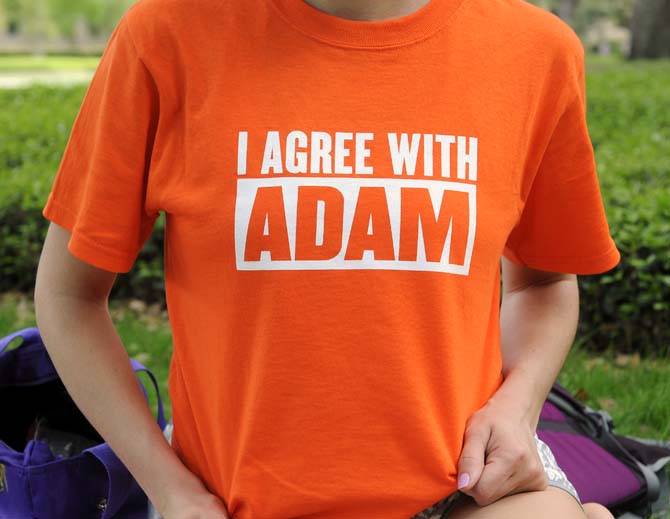Being worried about awareness of Christianity in southern Louisiana sounds like the punchline of an April Fools’ joke, but the more “I Agree With Adam” shirts I saw Tuesday, the more I realized it was a serious concern for a large group of people.
The whole campaign is based on some notion that Christianity should be talked about more, and Christians shouldn’t be afraid to show their faith.
Instead of this innocent narrative playing out, I Agree With Adam is a reminder that there is a group of people controlling most of the country who feel like non-Christians are missing a part of themselves, and those non-Christians need to ask the power-holding group what this missing piece is all about.
That’s pretty oppressive. Not violently, but mentally oppressive, and it already occurs on our campus daily.
You know those pamphlet-passing Christians who yell at Indian students about their heathen worshipping of Buddha, scream about women revealing their legs and threaten us concerning our lack of knowledge about life after death?
The Adam campaign concerns the same religion, and while the Adam-associated Christians don’t yell, their message-spreading tactics make it seem like a silent, impossible-to-ignore cult overtook campus this week, so excuse me if I react with a little sharpness.
Christianity runs so deep in our culture that it’s institutionalized. Those behind this campaign are mistaken in their belief that thoughtful Christianity deserves more awareness than it already receives.
If Adam followers want an open discussion about the religious hegemony, let’s talk about how Christianity still influences lawmakers — the woolly mammoth debate in South Carolina most recently. And many U.S. voters would still choose not to vote for an atheist president.
How about what’s printed on our money?
Let’s also bring up how no literature can escape a Godly interpretation in the English Department. This type of knowledge-based discussion of themes, however, is the kind of religious discussion I can agree with.
It’s a critical evaluation of the effects of religion on life, and that’s important. It can also spark discussions of the nature of religion and people’s personal beliefs, which is valid.
But this campaign doesn’t promote knowledge or civil argument. What we have here is a strong movement by one side forcing the other, historically oppressed side, to approach them.
And no matter how much good the Adam campaign members think they’re doing by being available to anyone who asks, being talked at by wide-eyed, evangelizing Christians isn’t something anyone should be forced or tricked into enduring. That’s what this whole campaign champions.
Apparently, Thursday is the day for answers, when Adam comes to campus, and I’m not looking forward to the escalated Christian propaganda that I’m sure will spread even further afterward, due to the amount of money someone has already spent.
In capitalist America, it’s difficult to ignore the implication this propaganda allows. Money means power, money backs Christianity, Christianity holds power.
Someone paid for the orange Adam shirts, the plane with an Adam banner that flew over campus Monday and the omnipresent Adam stickers. They don’t seem averse to handing out more materials.
I’d ask Christians participating to contemplate what they think they’re doing. I’m sure it sounds fulfilling and Biblical to passively evangelize, but the place it puts non-Christian students — and fellow disagreeing Christians — isn’t a sympathetic one.
In this way, it’s similar to the people yelling in Free Speech Plaza.
The only honest and open dialogue we need is Jesus Talks and the presence of nine churches less than a block away from campus. The resources exist, and everyone knows.
If students are interested, anyone is welcome to join groups run by the churches and attend services when they’re not attending class.
Christian propaganda doesn’t need to permeate our learning hours.
Opinion: I disagree with Adam, and you should too
By Megan Dunbar
April 1, 2014
A student wears a shirt reading “I Agree With Adam,” as part of a Christianity awareness campaign going on around campus.
More to Discover









